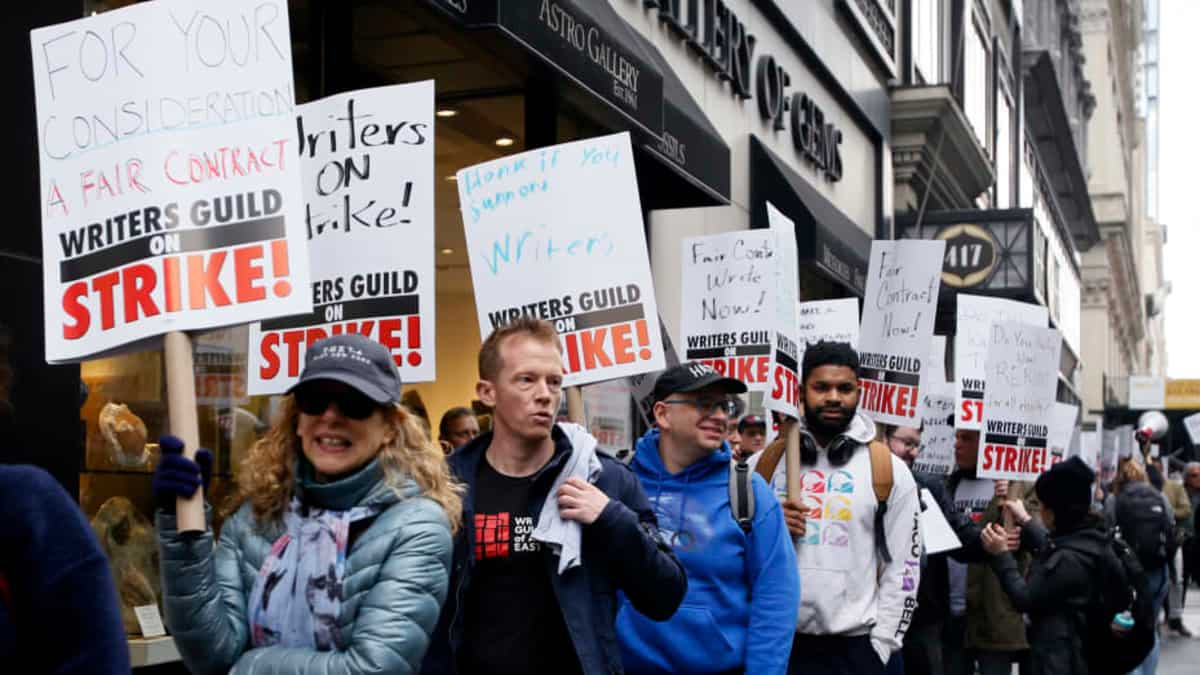Hollywood Shut Down: Actors And Writers On Strike

Table of Contents
Key Demands of the Writers Guild of America (WGA)
The Writers Guild of America's (WGA) strike is fueled by several critical demands centered around fair compensation and the protection of writers' rights in a rapidly evolving industry.
Fair Compensation in the Streaming Era
The shift to streaming has fundamentally altered the revenue model for writers, leading to significantly reduced residuals and overall compensation compared to the traditional television model.
- Reduced Residuals: Streaming platforms typically pay writers a lump sum for their work, unlike traditional television which offered residuals based on reruns and syndication. This means writers are not fairly compensated for the long-term success of their shows on streaming services.
- Unfair Compensation Practices: Many writers report receiving paltry payments for their work on hugely successful streaming shows, a stark contrast to the lucrative deals achieved in the past for network television.
- Impact of AI: The rise of artificial intelligence (AI) in writing poses a significant threat to writers' livelihoods, with concerns that AI could be used to replace human writers entirely, devaluing their expertise and skills.
Protecting Writers' Rights in the Age of AI
The WGA is fiercely advocating for safeguards against the unchecked use of AI in screenwriting. Their concerns are deeply rooted in the potential for AI to undermine the creative process and the value of human writers.
- AI-Generated Scripts: The WGA is worried about the increasing use of AI to generate scripts, potentially lowering the quality of storytelling and displacing human writers.
- Devaluation of Writers' Work: The fear is that AI could be used to create scripts at a fraction of the cost, drastically devaluing the work and expertise of professional screenwriters.
- Proposed Regulations: The WGA is pushing for clear regulations and guidelines on the use of AI in screenwriting, ensuring that human creativity remains central to the process. They want strong protections against the use of AI to replace writers' jobs.
SAG-AFTRA's Fight for Fair Wages and Working Conditions
The Screen Actors Guild - American Federation of Television and Radio Artists (SAG-AFTRA) strike mirrors many of the WGA's concerns, focusing on fair wages, improved working conditions, and protection against the misuse of actors' likenesses through AI.
Minimum Wage and Residuals
Actors, particularly those working on streaming projects, are facing significant challenges in terms of compensation. Inflation and the shift to streaming have created a significant disparity.
- Streaming vs. Traditional Media: Actors often receive drastically lower residuals for streaming projects than for traditional television shows and films. This represents a significant loss of income over the lifespan of a project.
- Impact of Inflation: The rising cost of living has eroded the purchasing power of actors' salaries, particularly for those whose income depends heavily on residuals.
- Low Pay for High-Profile Projects: Many actors report receiving extremely low pay, even on successful streaming series, highlighting an imbalance of power between studios and performers.
Self-Tape Auditions and AI Concerns
SAG-AFTRA is actively addressing concerns about the excessive use of unpaid self-tape auditions and the potential misuse of actors' images and likenesses through AI.
- Exploitation of Unpaid Labor: The reliance on self-tape auditions often involves actors incurring costs for equipment and time without any guarantee of compensation.
- Better Working Conditions: SAG-AFTRA seeks to improve working conditions for actors, ensuring fair compensation for their time and talent, including fair payment for self-tapes.
- AI Deepfakes and Exploitation: The union is deeply concerned about the use of AI-generated deepfakes to exploit actors' images without their consent or compensation.
The Impact of the Hollywood Strike
The Hollywood strike is not just affecting actors and writers; its economic consequences are far-reaching and affect many facets of the entertainment industry and beyond.
Economic Consequences
The strike has created a significant economic ripple effect impacting various businesses and workers.
- Production Companies: Production companies are facing significant financial losses due to stalled productions and potential delays in project releases.
- Studio Employees: Numerous studio employees, including crew members and support staff, are facing unemployment or reduced hours due to the lack of production.
- Local Businesses: Businesses that cater to the film industry, such as restaurants and hotels, are experiencing decreased revenue as a result of the strike.
- Overall Economic Impact: The combined financial losses across the various sectors amount to billions of dollars, illustrating the significant economic impact of the strike.
Impact on Upcoming Productions
The Hollywood strike has already caused significant delays and cancellations of numerous film and television projects.
- High-Profile Projects Affected: Numerous high-profile films and television shows have been impacted, leading to indefinite delays or complete cancellations. Specific examples should be included here, referencing recent news reports.
- Ripple Effect on Release Schedules: The strike has disrupted release schedules, potentially impacting the overall flow of new content and significantly impacting studio revenue.
- Long-Term Impact: The prolonged nature of the strike could have a substantial long-term impact on the industry, potentially leading to shifts in production models and altering the landscape of filmmaking and television.
Conclusion
The Hollywood strike, driven by the powerful demands of the WGA and SAG-AFTRA for fair compensation, improved working conditions, and safeguards against AI, represents a watershed moment in the entertainment industry. The economic impact is undeniable, and the future of filmmaking and television hangs in the balance. Understanding the core issues behind this Hollywood strike – from fair wages and residuals to the ethical considerations surrounding AI – is crucial for navigating this critical period. Stay informed about the ongoing negotiations and support fair treatment for actors and writers. Learn more about the Hollywood strike and how you can help ensure a fair and sustainable future for the entertainment industry. The resolution of this Hollywood strike will be a defining moment for the future of creativity and labor in Hollywood.

Featured Posts
-
 Kompany Onder Vuur Vernederende Nederlaag
May 11, 2025
Kompany Onder Vuur Vernederende Nederlaag
May 11, 2025 -
 Thomas Mueller O Legenda A Bayern Munchen Isi Ia Ramas Bun
May 11, 2025
Thomas Mueller O Legenda A Bayern Munchen Isi Ia Ramas Bun
May 11, 2025 -
 Next Pope Predicting The Future Leader Of The Catholic Church
May 11, 2025
Next Pope Predicting The Future Leader Of The Catholic Church
May 11, 2025 -
 Unexpected Hit Henry Cavill In The Action Thriller Night Hunter
May 11, 2025
Unexpected Hit Henry Cavill In The Action Thriller Night Hunter
May 11, 2025 -
 Could Marvels Cancellation Be Henry Cavills Gain Exploring The Possibilities
May 11, 2025
Could Marvels Cancellation Be Henry Cavills Gain Exploring The Possibilities
May 11, 2025
